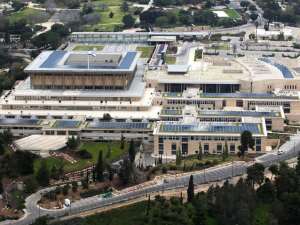
Accra, Ghana, Thursday, March 26, 2015: A total of 465 hectare of solar panels has been installed on the roofs of Knesset, the Israeli Parliament. These panels were created especially for the Knesset's solar field, which is laid out over 4,650 square meters of the Knesset roofs and will have an installed capacity of 450 kilowatts.
The solar array, which cost the Knesset US $ 600,000, will create some 10% of the Knesset's electricity, and together with additional energy-saving measures, it will help reduce the Knesset's energy use by a third.
The solar array is expected to save the Knesset US $ 75,000 every year. It will operate according to the net-metering method, under which electric energy generated by an electric consumer from an eligible on-site generating facility and delivered to the local distribution facilities may be used to offset electric energy provided by the electric utility to the electric consumer during the applicable billing period.
The Knesset's solar array will be the first of any national institution to operate according to this method. Director General of the Knesset, Mr. Ronen Plot, hopes that other government institutions and local authorities will follow suit and establish solar fields of their own.
In 2014, the Knesset launched the first part of its Green Knesset project consisting of 13 approved and budgeted advanced projects for saving energy and water. The Knesset has invested US $ 1,750,000 in all, and the yearly savings that will come from the project are estimated at US $ 375,000 a year. All of the projects that were approved are economically viable and the project should pay for itself within five years.
The Green Knesset project includes not just the establishment of a solar field for the creation of electricity from renewable energy, but also the installation of thousands of LED lights, installing a new chiller in the energy center whose residual heat will be used to heat water, automatic shutdown of computers at the end of every workday, a review of the Knesset's water usage for gardening purposes and changing to a more economical irrigation model and the desalination of the condensation of the air conditioning systems and using them for irrigation. In addition to the monetary savings, the energy savings will reduce the carbon output and therefore the carbon footprint of the Knesset.
Ends
For further details and information, please contact the Press and Public Diplomacy Coordinator at the Embassy, Mr. Seth Owusu-Mante: [email protected].
Link to video on YouTube: https://youtu.be/iJemTKNcwH8




 Ejisu by-election: Aduomi warns NPP against voter intimidation
Ejisu by-election: Aduomi warns NPP against voter intimidation
 High Court orders implicated four NDA officials to present defence
High Court orders implicated four NDA officials to present defence
 Let’s all be matured, patriotic to have a peaceful election this year – Dampare ...
Let’s all be matured, patriotic to have a peaceful election this year – Dampare ...
 Mahama's administration saw thievery that knew no bounds; stole from market wome...
Mahama's administration saw thievery that knew no bounds; stole from market wome...
 GRA/SML deal: Always read the stories behind the headlines or you'd look stupid ...
GRA/SML deal: Always read the stories behind the headlines or you'd look stupid ...
 GRA/SML Contract: It takes some 'wild' boldness for a president to make this dec...
GRA/SML Contract: It takes some 'wild' boldness for a president to make this dec...
 Elisu By-election: "If you call yourself a man, boo Chairman Wontumi again" — Bo...
Elisu By-election: "If you call yourself a man, boo Chairman Wontumi again" — Bo...
 Fuel tanker driver escapes with his life after tanker goes up in flames near Suh...
Fuel tanker driver escapes with his life after tanker goes up in flames near Suh...
 Uniform change: ‘Blue and white are brighter colours’ — Kwasi Kwarteng explains ...
Uniform change: ‘Blue and white are brighter colours’ — Kwasi Kwarteng explains ...
 MoE not changing all public basic school uniforms but only newly built ones — Kw...
MoE not changing all public basic school uniforms but only newly built ones — Kw...
